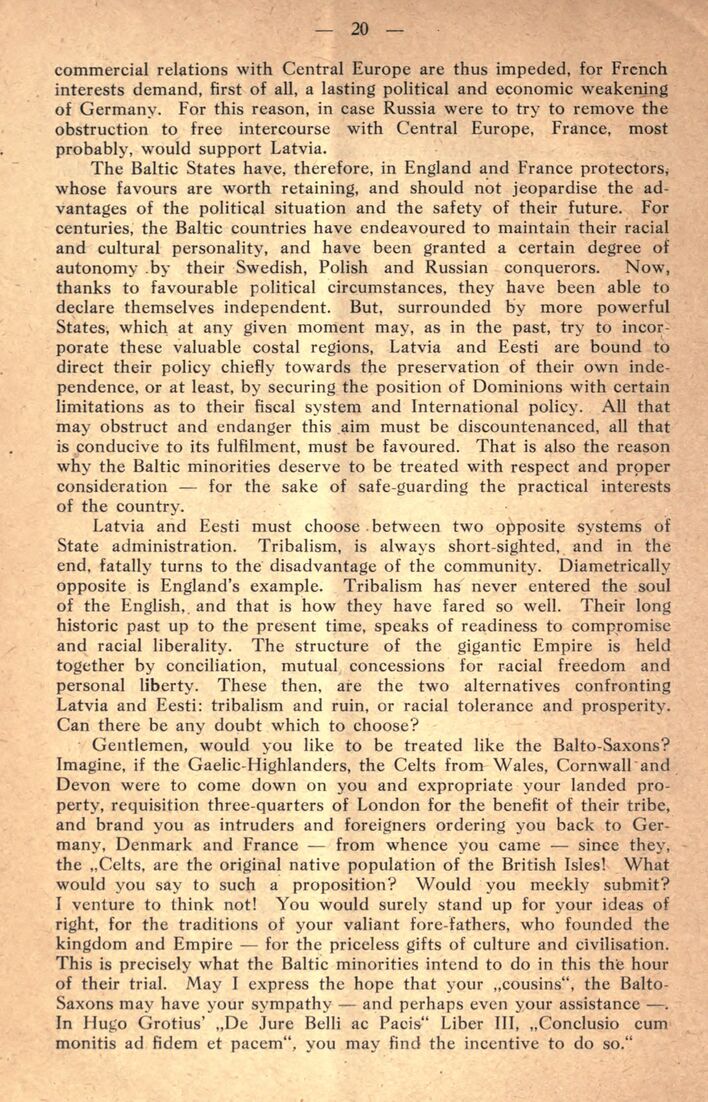
Full resolution (JPEG) - On this page / på denna sida - Chapter II. The Baltic Minorities' Rights. Their relation to Municipal and International Law. Lecture delivered at the Grotius Society in London, November 1921

<< prev. page << föreg. sida << >> nästa sida >> next page >>
Below is the raw OCR text
from the above scanned image.
Do you see an error? Proofread the page now!
Här nedan syns maskintolkade texten från faksimilbilden ovan.
Ser du något fel? Korrekturläs sidan nu!
This page has been proofread at least once.
(diff)
(history)
Denna sida har korrekturlästs minst en gång.
(skillnad)
(historik)
commercial relations with Central Europe are thus impeded, for French
interests demand, first of all, a lasting political and economic weakening
of Germany. For this reason, in case Russia were to try to remove the
obstruction to free intercourse with Central Europe, France, most
probably, would support Latvia.
The Baltic States have, therefore, in England and France protectors,
whose favours are worth retaining, and should not jeopardise the
advantages of the political situation and the safety of their future. For
centuries, the Baltic countries have endeavoured to maintain their racial
and cultural personality, and have been granted a certain degree of
autonomy by their Swedish, Polish and Russian conquerors. Now,
thanks to favourable political circumstances, they have been able to
declare themselves independent. But, surrounded by more powerful
States, which at any given moment may, as in the past, try to
incorporate these valuable costal regions, Latvia and Eesti are bound to
direct their policy chiefly towards the preservation of their own
independence, or at least, by securing the position of Dominions with certain
limitations as to their fiscal system and International policy. All that
may obstruct and endanger this aim must be discountenanced, all that
is conducive to its fulfilment, must be favoured. That is also the reason
why the Baltic minorities deserve to be treated with respect and proper
consideration — for the sake of safe-guarding the practical interests
of the country. ,
Latvia and Eesti must choose between two opposite systems of
State administration. Tribalism, is always short-sighted, and in the
end, fatally turns to the disadvantage of the community. Diametrically
opposite is England’s example. Tribalism has never entered the soul
of the English, and that is how they have fared so well. Their long
historic past up to the present time, speaks of readiness to compromise
and racial liberality. The structure of the gigantic Empire is held
together by conciliation, mutual concessions for racial freedom and
personal liberty. These then, are the two alternatives confronting
Latvia and Eesti: tribalism and ruin, or racial tolerance and prosperity.
Can there be any doubt which to choose?
Gentlemen, would you like to be treated like the Balto-Saxons?
Imagine, if the Gaelic-Highlanders, the Celts from Wales, Cornwall and
Devon were to come down on you and expropriate your landed
property, requisition three-quarters of London for the benefit of their tribe,
and brand you as intruders and foreigners ordering you back to
Germany, Denmark and France — from whence you came — since they,
the „Celts, are the original native population of the British Isles! What
would you say to such a proposition? Would you meekly submit?
I venture to think not! You would surely stand up for your ideas of
right, for the traditions of your valiant fore-fathers, who founded the
kingdom and Empire — for the priceless gifts of culture and civilisation.
This is precisely what the Baltic minorities intend to do in this the hour
of their trial. May I express the hope that your „cousins“, the
Balto-Saxons may have your sympathy — and perhaps even your assistance —.
In Hugo Grotius’ „De Jure Belli ac Pacis“ Liber III, „Conclusio cum
monitis ad fidem et pacem“, you may find the incentive to do so.“
<< prev. page << föreg. sida << >> nästa sida >> next page >>